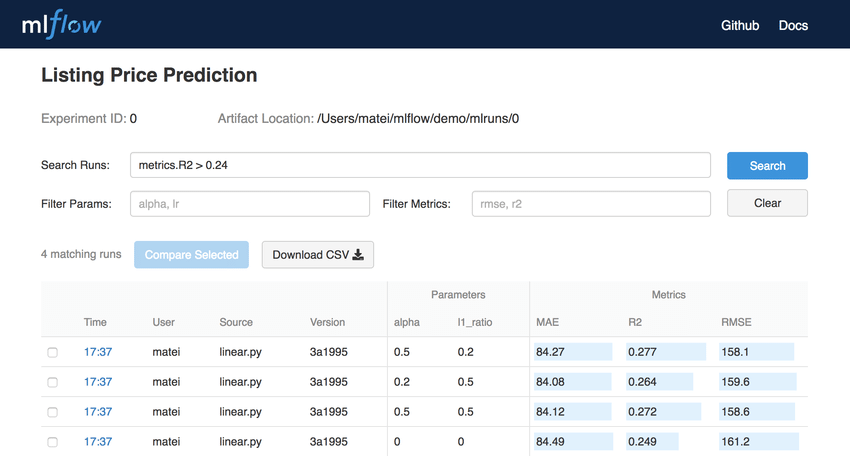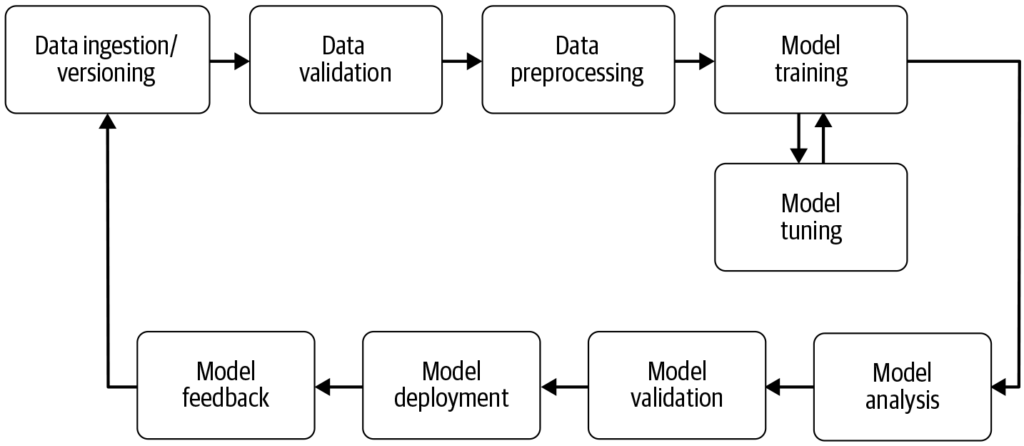
Kubeflow
Kubeflow is an open-source machine learning (ML) platform on Kubernetes, simplifying the deployment, management, and scaling of ML workflows. It offers a suite ...
MLflow streamlines the machine learning lifecycle with tools for experiment tracking, model management, collaboration, and reproducible ML workflows.
MLflow is an open-source platform that streamlines the ML lifecycle, offering tools for experiment tracking, code packaging, model management, and collaboration. Its components enhance reproducibility, deployment, and lifecycle control across various environments.
MLflow is an open-source platform designed to streamline and manage the machine learning (ML) lifecycle, addressing the complexities involved in the development, deployment, and management of machine learning models. It provides a suite of tools that enable data scientists and machine learning engineers to track experiments, package code, manage models, and collaborate in a more organized and efficient manner. MLflow is library-agnostic, making it compatible with a wide array of machine learning frameworks and libraries.
MLflow is structured around four primary components, each serving a specific purpose in the machine learning workflow:
What It Is
MLflow Tracking is a component that provides an API and UI to log machine learning experiments. It records and queries parameters, code versions, metrics, and output files (artifacts).
Use Case
A data scientist can use MLflow Tracking to log different hyperparameters used in various experiments and compare their effects on model performance. For instance, while training a neural network, different learning rates and batch sizes can be logged and analyzed to determine which configuration yields the best results.
Example
Logging parameters such as learning rate, batch size, and metrics like accuracy and loss during the training of a model. This information helps in visualizing and comparing multiple runs to identify the most effective hyperparameter settings.
What It Is
MLflow Projects provides a standard format for packaging and sharing machine learning code. It ensures that experiments are reproducible and portable, defining project dependencies and execution environments.
Use Case
When collaborating on a project across different teams or deploying models to various environments, MLflow Projects ensures that the code runs consistently regardless of where it is executed.
Example
A project directory containing a MLproject file that specifies how to run the code, its dependencies, and entry points. This setup allows a team to easily share their work and reproduce results in different environments.
What It Is
MLflow Models is a component that allows you to package machine learning models in a format that can be deployed on multiple platforms, supporting real-time or batch inference.
Use Case
After training a model, a data scientist can use MLflow Models to package the model along with its dependencies, making it ready for deployment on cloud platforms like AWS SageMaker or Azure ML.
Example
Saving a trained model in MLflow format, which includes a serialized model file and an MLmodel configuration file. This ensures that the model can be easily loaded and used for inference in various environments.
What It Is
The Model Registry is a centralized store for managing the lifecycle of MLflow Models. It provides model versioning, stage transitions, and annotations, ensuring proper governance and collaboration.
Use Case
In a production setting, the Model Registry helps MLOps teams manage model versions, track changes, and control model deployment stages from development to production.
Example
Registering a model in the MLflow Model Registry, assigning it a version number, and transitioning it through stages such as “Staging” and “Production” to ensure a controlled release process.
MLflow offers several advantages that enhance the machine learning development process:
MLflow is versatile and can be applied in various machine learning scenarios:
MLflow’s capabilities extend to AI automation and chatbot development by providing tools that streamline the training, deployment, and monitoring of AI models. For instance, in developing chatbots, MLflow can be used to train natural language processing models, track their performance across different datasets, and manage their deployment in various conversational platforms, ensuring that the chatbot’s responses are accurate and reliable.
Research on MLflow
MLflow is an open-source platform designed to manage the machine learning lifecycle, including experimentation, reproducibility, and deployment. It is increasingly utilized in various scientific and industrial applications to streamline the workflow of machine learning projects.
SAINE: Scientific Annotation and Inference Engine of Scientific Research
In this paper, the authors introduce SAINE, an annotation engine that incorporates MLflow to improve classification processes in scientific research. The study highlights how MLflow aids in the development of a transparent and accurate classification system. The engine supports meta-science projects and fosters collaboration within the scientific community. The paper also offers a demonstration video and live demo for a better understanding of the system’s capabilities. Read more.
IQUAFLOW: A new framework to measure image quality
IQUAFLOW utilizes MLflow to provide a framework for assessing image quality by evaluating AI model performance. The framework integrates custom metrics and facilitates studies on performance degradation due to image modifications like compression. MLflow is used as an interactive tool to visualize and summarize results in this context. This paper describes various use cases and provides supplementary repository links. Explore further.
Towards Lightweight Data Integration using Multi-workflow Provenance and Data Observability
This study proposes MIDA, a framework that leverages MLflow for data observability and integration across various computing environments. It addresses challenges in multidisciplinary collaborations and supports Responsible AI development. MLflow plays a role in managing dataflows across different systems without additional instrumentation, enhancing the reproducibility and efficiency of scientific workflows.
MLflow is an open-source platform that streamlines the machine learning lifecycle, offering tools for experiment tracking, code packaging, model management, and collaboration. It enhances reproducibility, deployment, and lifecycle control across various environments.
MLflow consists of four main components: Tracking (to log and compare experiments), Projects (for packaging code), Models (for packaging and deploying models), and Model Registry (for managing model versions and deployment stages).
MLflow centralizes experiment data and provides a unified platform, facilitating knowledge sharing and teamwork among data scientists and engineers.
Yes, MLflow is library-agnostic and compatible with a wide array of machine learning frameworks and libraries.
MLflow can be used for experiment tracking, model selection and deployment, performance monitoring, and organizing collaborative machine learning projects.
Start building AI solutions and streamline your machine learning lifecycle by integrating MLflow. Enhance collaboration, reproducibility, and deployment—all in one platform.
Kubeflow is an open-source machine learning (ML) platform on Kubernetes, simplifying the deployment, management, and scaling of ML workflows. It offers a suite ...
A machine learning pipeline is an automated workflow that streamlines and standardizes the development, training, evaluation, and deployment of machine learning...
BigML is a machine learning platform designed to simplify the creation and deployment of predictive models. Founded in 2011, its mission is to make machine lear...


